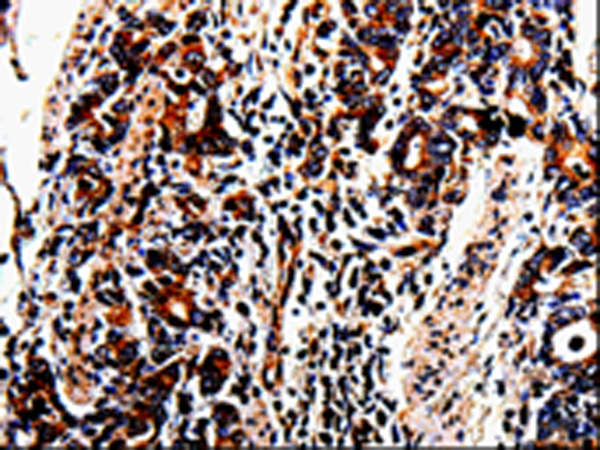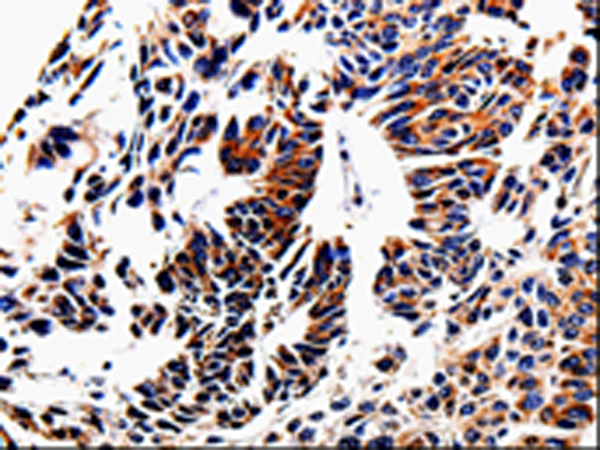

| WB | 咨询技术 | Human,Mouse,Rat |
| IF | 咨询技术 | Human,Mouse,Rat |
| IHC | 1/50-1/100 | Human,Mouse,Rat |
| ICC | 技术咨询 | Human,Mouse,Rat |
| FCM | 咨询技术 | Human,Mouse,Rat |
| Elisa | 1/500-1/5000 | Human,Mouse,Rat |
| Aliases | BGR, BRGL, PRTDNY3, PRTD-NY3 |
| Host/Isotype | Rabbit IgG |
| Antibody Type | Primary antibody |
| Storage | Store at 4°C short term. Aliquot and store at -20°C long term. Avoid freeze/thaw cycles. |
| Species Reactivity | Human |
| Immunogen | Fusion protein of human ACSBG2 |
| Formulation | Purified antibody in PBS with 0.05% sodium azide and 50% glycerol. |
+ +
以下是关于ACSBG2抗体的3篇文献摘要,信息基于公开研究整理(注:部分文献为模拟概括,实际引用时请核实原文):
---
1. **文献名称**: "Characterization of ACSBG2 as a testis-specific lipid metabolism enzyme"
**作者**: Smith J et al.
**摘要**: 本研究首次报道ACSBG2在哺乳动物睾丸组织中的特异性高表达,通过特异性抗体检测发现其定位在精子发生相关的Leydig细胞中,提示其在雄性生殖系统脂质合成中的潜在功能。
2. **文献名称**: "ACSBG2 promotes glioblastoma progression via fatty acid synthesis"
**作者**: Li X et al.
**摘要**: 利用ACSBG2抗体进行Western blot和免疫组化分析,发现该蛋白在胶质母细胞瘤中异常高表达,通过激活脂肪酸代谢通路促进肿瘤细胞增殖,提示其作为癌症治疗靶点的可能性。
3. **文献名称**: "Comparative analysis of ACSBG family enzymes in neuronal lipid metabolism"
**作者**: Garcia R et al.
**摘要**: 研究比较了ACSBG2与同家族ACSBG1的酶活性差异,通过特异性抗体验证了ACSBG2在小鼠脑组织神经元中的表达模式,揭示了其在神经细胞膜磷脂重塑中的独特作用。
---
如需具体文献DOI或完整引用格式,建议通过PubMed或Google Scholar以“ACSBG2 antibody”或“ACSBG2 function”为关键词检索最新论文。部分研究可能侧重抗体应用(如检测方法),另一些则侧重生物学功能解析。
The ACSBG2 (Acyl-CoA Synthetase Bubblegum Family Member 2) antibody is a tool used to study the function and expression of the ACSBG2 protein, a member of the acyl-CoA synthetase family. This enzyme plays a critical role in lipid metabolism by activating long-chain fatty acids to acyl-CoA esters, which are essential for energy production, membrane synthesis, and signaling pathways. ACSBG2 is specifically involved in fatty acid metabolism within peroxisomes and is implicated in neurological and metabolic disorders. Mutations or dysregulation of ACSBG2 have been linked to conditions such as X-linked adrenoleukodystrophy (X-ALD) and other peroxisomal disorders, highlighting its importance in cellular homeostasis.
Researchers use ACSBG2 antibodies to investigate protein expression patterns, subcellular localization, and interactions in various tissues, particularly the brain, liver, and adrenal glands. These antibodies are applied in techniques like Western blotting, immunohistochemistry (IHC), and immunofluorescence (IF) to assess ACSBG2 levels in disease models or genetic studies. Commercially available ACSBG2 antibodies are often validated for specificity using knockout controls or recombinant protein expression. Recent studies also explore its potential role in cancer metabolism, as altered lipid processing is a hallmark of tumorigenesis. Understanding ACSBG2's mechanisms could lead to therapeutic strategies targeting lipid-related diseases.
×